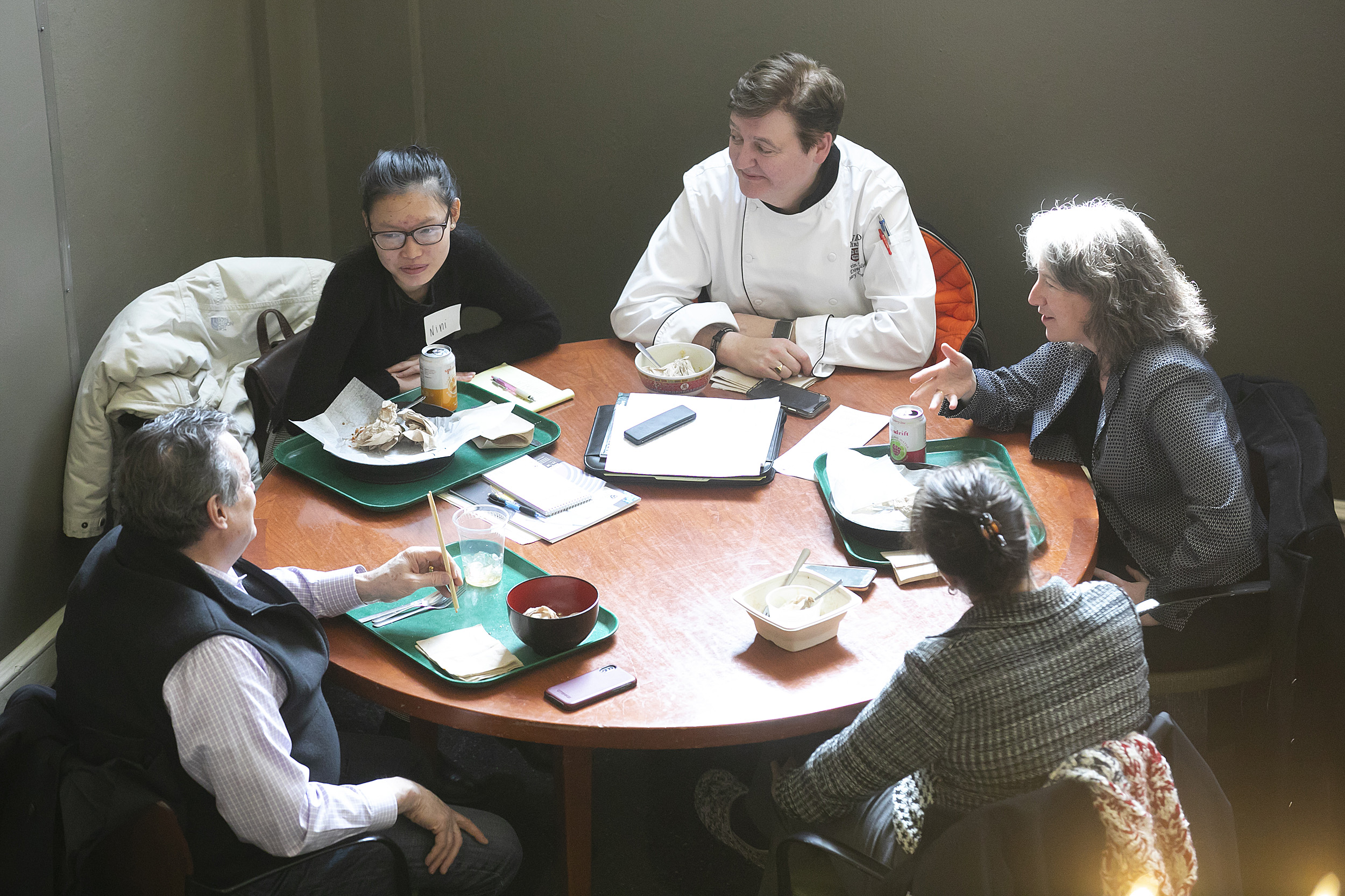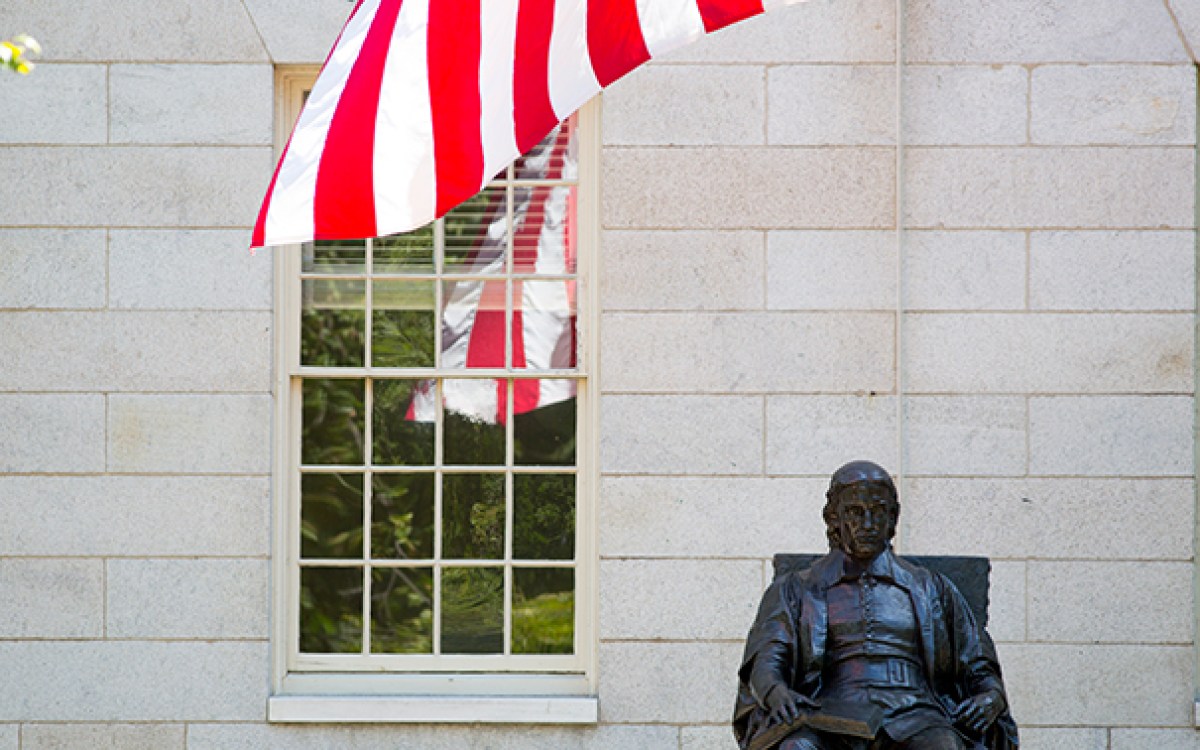
Boston Latin Academy sophomore Nini Nguyen (second from left) participates in the job shadow day at Harvard.
Jon Chase/Harvard Staff Photographer
Demystifying the workplace
Seeing firsthand the variety of roles in an organization can give young people a whole new perspective
A group of students from the Boston Public Schools (BPS) spent the day on Harvard’s campus recently as part of an annual job-shadowing program run in partnership with the Boston Private Industry Council (PIC). The students toured the campus and spoke with staff in a variety of settings to explore specific occupations, network, and get college and career advice.
“We’re always incredibly excited to partner with the PIC and to host so many incredible local students on campus,” said Michelle Gordon-Seemore, Harvard’s director of talent acquisition and diversity. “It’s an immensely valuable program for Harvard. We love interacting with, hearing from, and learning from our neighbors. It’s as rewarding for us as we hope it is for them.”
The students — current sophomores and juniors from a host of different BPS schools — met with, and received advice from, reporters for the Harvard Gazette and representatives from the Community Affairs Office, Human Resources, Faculty of Arts and Sciences (FAS), Harvard University Dining Services (HUDS), and Campus Services.
“I think sometimes high schoolers feel pressured to check as many boxes as they can in order to make it appear as though they have a well-rounded college application,” said Liz Mineo, a reporter for the Gazette. “But the truth is that it’s often more important to find your passion. Admissions officers are looking for that fire, what makes you tick. It’s not the quantity of what you participate in, it’s the quality.”
Jill Radsken, associate director of the Faculty of Arts and Sciences Editorial, advised students to “be curious about everything. Ask questions. Learn something new. That should be your everyday mindset.”
Nguyen shared her thoughts on the experience, and what she learned, with the Gazette:
My day consisted of meeting and talking with several employees of Harvard from various departments, including Campus Services and Public Affairs & Communications. They asked us our life goals and dreams, and it was clear these adults were invested in our careers and wanted us to succeed. The people I met all come from different backgrounds, and all gave beneficial advice. The employees shared their experiences with jobs and college as well as opportunities in high school that pushed them in the direction of their current occupation. Their stories had one thing in common: No one had one clear path dictated from the beginning.
As a person with many interests, I was concerned about dedicating my life to one career and having to decide very early on what I wanted to do. For most of my life, I have been surrounded by people with conventional and standard jobs, for example my teachers and parents, who probably won’t be changing their career paths anytime soon. The idea that I have to choose a single path is strengthened when I hear many of my peers insisting they want to become lawyers, doctors, teachers, etc. It never occurred to me that I don’t have to settle on one passion, but can explore and use myriad skills that could accommodate countless of jobs. These people have shown me is it normal to not know what I want to pursue yet. I just have to be willing to work hard and make sure I do something that makes me happy.
I connected most with Meredith Weenick because of her informative advice and scintillating conversation. She taught me that leadership does not have to run with an iron fist. Seeing the way Meredith treats her colleagues was a life lesson: Being professional and kind is just as important as working hard to become successful. During my time with her, we toured the Smith Campus Center and went to lunch on campus. She introduced me to some of her colleagues who worked in the dining department. As a conversation-starter they asked me for feedback on the lunch, and it was clear they wanted to provide the best for their students. I appreciated their interest in me even though I am not a Harvard student. The people I met during lunch provided nice, light-hearted conversation. There was no other way I would have wanted to end the day.
My experience was enlightening. It alleviated a lot of my confusion about choosing a career. I am beyond thrilled that I took advantage of this opportunity and had the pleasure to meet and converse with these people. Their engagement and patience with us made it clear that they valued the experience as much as we did.
“During the time I spent with Nini, she impressed me with her inquisitive nature, her cheerful demeanor, and her thoughtful insights,” said Weenick. “These programs are great ways to engage with our local community. It never ceases to amaze me how fortunate we are to meet so many smart, talented, and incredible young students from both Boston and Cambridge through the many programs and partnerships we host on campus.”
The annual job-shadow day is just one of the opportunities local students have to come to campus. For more than two decades Harvard’s Summer Youth Employment Program (SYEP) has offered students in Boston and Cambridge the chance to work in various departments across the University.
Holding down a job as a teenager has been found to translate into better jobs skills as an adult, and ultimately higher lifetime earnings. SYEP helps local teens develop strong work habits, establish networks, and acquire real-world work experience. Oftentimes the job serves as a teen’s first professional experience. They learn how to meet deadlines and be accountable, as well as the importance of teamwork.
“I highly recommend and urge departments across campus to get involved with one — or many — of these programs,” said Weenick. “SYEP in particular is a great way to give local students the opportunity to develop valuable skills, gain experience in the workforce, and of course obtain a well-earned paycheck. It’s also an easy, cost-effective way for departments all across the University to fill temporary staffing needs, as well as to mentor a new generation of workers.”
If you or someone in your department is interested in hiring a teen this summer, a Lunch & Learn session will be held on April 15 (register here) at which you can hear more about the process, learn how to apply, and determine what assistance is available to help you find the right employee for your department. Students work from July 8 to Aug. 16 and can take on a variety of assignments, including office support, writing, scheduling, athletic support, customer service, and maintenance. The deadline for submitting a request for a summer employee is April 30. You can do so here.
If you have any questions, please contact Gordon-Seemore at Michelle_Gordon-Seemore@harvard.edu or at 617-495-3303.






